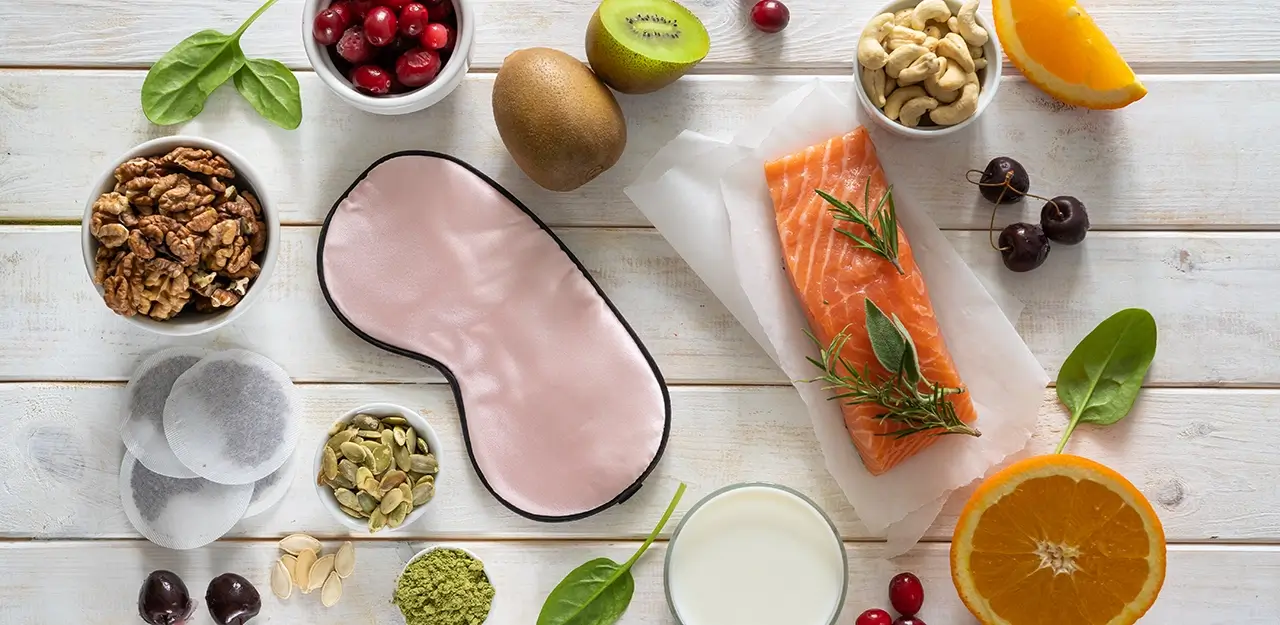
As a registered nutritionist who has lived with insomnia for decades, I’ve spent a lot of time researching the link between food and sleep. If you also frequently lie awake, tossing and turning, despite being desperately tired, you are not alone. ‘The Sleep Charity’ has found that nine in ten people in the UK are experiencing problems with their sleep.
Given the average human spends around one third of their life asleep (though I’ve never managed that myself - I never did like being average!!), it’s no surprise that sleep is a crucial physiological process that impacts our physical health, mood and cognitive function[1]. Sleep is important, so bump it up your ‘to do’ list!
Can we improve our sleep by what we eat? Unfortunately, food alone is unlikely to cure chronic sleep disturbances, but there’s some evidence that certain nutrients can support better sleep quality and duration. I’m focusing on three of the most significant nutrients here….
The Sleep Mineral
Magnesium is a mineral involved in hundreds of enzymatic reactions of the body, including those associated with sleep and relaxation[2]. Several studies suggest there may be an association between magnesium supplements and better sleep quality[3]. However, if you are not magnesium deficient, there is little evidence to suggest that having high levels will improve sleep and any excess is simply excreted.
As a nutritionist, I like to focus on ‘food first’ if possible, so with that in mind, to maximise magnesium in your diet, fill your fluffy bed socks with[4]:
- Dark green vegetables such as broccoli, kale, cooked spinach
- Nuts such as almonds, cashews, peanuts
- Seeds such as pumpkin, chia and flax
- Wholegrains such as oats, wholemeal bread, brown rice
- Legumes such as lentils, chickpeas, black beans
- Fish such as salmon, mackerel, tuna
- Dairy such as milk, yoghurt, fortified plant milk
The Sleep Hormone
Melatonin is a hormone that helps regulate your sleep-wake cycle. It’s naturally produced in the evening, signalling your body to wind down and may also play a role in building the ‘sleep drive’[5]. While melatonin supplements are prescribed for short-term issues like jet lag or stress, and for neurodivergent children, they’re not a magic fix and at best, its effects are modest and variable[6, 7].
There are some studies associating dietary sources of melatonin with improved sleep time and sleep efficiency, for example tart cherry juice[8], but this needs further research. So before you rush out to ask your doctor for supplements or get obsessed with tart cherry juice, you could focus on eating a variety of dietary sources of melatonin[4, 9]:
- Fruit such as tart cherries, goji berries, kiwi
- Eggs
- Dairy such as milk, cheese
- Fish such as salmon, sardines
- Nuts such as almonds, walnuts, pistachios
The Sleep Amino Acid
Tryptophan is an essential amino acid that helps your body make melatonin and serotonin. Supplements may have a beneficial impact on sleep quality[10], but this needs more research.
Milk is a good dietary source of tryptophan and has repeatedly been associated with improved sleep quality, in both children and adults[11]. There is less evidence for other dietary sources of tryptophan, but if you want to increase your intake, these are some options[4]:
- Dairy such as milk, yoghurt, cheese
- Nuts such as cashews, pistachios
- Seeds such as pumpkin, sunflower, chia
- Legumes such as soybeans, edamame, tofu
- Poultry such as chicken, turkey
- Eggs
Interestingly, combining tryptophan-rich foods with carbohydrate foods can improve how effectively the brain absorbs tryptophan, helping it cross the blood-brain barrier more easily[12].
So, there is actually some science behind your grandma’s favourite bedtime drink of milk (tryptophan source) and honey (carbohydrate). Perhaps she may also try sprinkling some seeds on top?!
Food First Approach
Unless you have a nutrient deficiency, there’s usually no need to spend your hard-earned cash on expensive supplements. However, I of all people understand the desperation arising from poor sleep. If you’re tempted to try a supplement, including herbal remedies, always consult your doctor, as they can interact with other medication.
The foods that contain the nutrients we have discussed (magnesium, melatonin and tryptophan) are all great choices for health, so there’s no harm in experimenting to see if consuming these foods helps you sleep better. There is little evidence in the research about the timings of consumption, so just build these choices into everyday life. There’s no need to force down a combo of kale, tart cherries and cheese at bedtime!
Indeed, obsessing about individual foods and rigid goals in terms of food choices, timings
and quantities frequently leads to a poor relationship with food. It can be boring too, for
example, cooked baby spinach is a great source of magnesium, with 112mg in a 100g portion, but you’d have to eat a mountain of it to achieve even the daily recommendations of 300mg for men and 270mg for women. So rather than focusing on individual foods, I would recommend zooming out and considering your diet as a whole.
My understanding is there’s no magic bullet for sleep, however much you try and manipulate your nutrition. The nutrients that may help with sleep are all available in a balanced, varied diet. A Mediterranean-style dietary pattern is generally a good place to start, including plenty of fruit, vegetables, legumes, wholegrains, nuts, seeds, dairy and lean animal protein such as poultry and fish.
You may just find that a better night’s sleep starts on your plate!
References
- Itani, O., et al., Short sleep duration and health outcomes: a systematic review, meta-analysis, and meta-regression. Sleep Med, 2017. 32: p. 246-256.
- Wienecke, E. and C. Nolden, [Long-term HRV analysis shows stress reduction by magnesium intake]. MMW Fortschr Med, 2016. 158(Suppl 6): p. 12-16.
- Arab, A., et al., The Role of Magnesium in Sleep Health: a Systematic Review of Available Literature. Biol Trace Elem Res, 2023. 201(1): p. 121-128.
- Finglas, P.M., Roe, M.A., Pinchen H.M., Berry R., Church S.M., Dodhia S.K., Farron- Wilson M. & Swan G., McCance and Widdowson's The Composition of Foods. 2015: Cambridge: Royal Society of Chemistry.
- Comai, S. and G. Gobbi, Melatonin, Melatonin Receptors and Sleep: Moving Beyond Traditional Views. J Pineal Res, 2024. 76(7): p. e13011.
- Kennaway, D.J., What do we really know about the safety and efficacy of melatonin for sleep disorders? Curr Med Res Opin, 2022. 38(2): p. 211-227.
- Fatemeh, G., et al., Effect of melatonin supplementation on sleep quality: a systematic review and meta-analysis of randomized controlled trials. J Neurol, 2022. 269(1): p. 205-216.
- Losso, J.N., et al., Pilot Study of the Tart Cherry Juice for the Treatment of Insomnia and Investigation of Mechanisms. Am J Ther, 2018. 25(2): p. e194-e201.
- Meng, X., et al., Dietary Sources and Bioactivities of Melatonin. Nutrients, 2017. 9(4).
- Sutanto, C.N., W.W. Loh, and J.E. Kim, The impact of tryptophan supplementation on sleep quality: a systematic review, meta-analysis, and meta-regression. Nutr Rev, 80(2): p. 306-316.
- Komada, Y., I. Okajima, and T. Kuwata, The Effects of Milk and Dairy Products on Sleep: A Systematic Review. Int J Environ Res Public Health, 2020. 17(24).
- Markus, C.R., Effects of carbohydrates on brain tryptophan availability and stress performance. Biol Psychol, 2007. 76(1-2): p. 83-90.
About our Team
A Registered Nutritionist, Helen is passionate about helping people improve their health and wellbeing through practical, friendly and honest nutrition advice where nothing is off the menu.
Related Articles
Sales Enquiries
Mon-Sat: 9:30am - 5:30pm
Sunday: 10am - 4pm
Customer Service
Mon-Sat: 9:30am - 5:30pm
Sunday: 10am - 4pm











